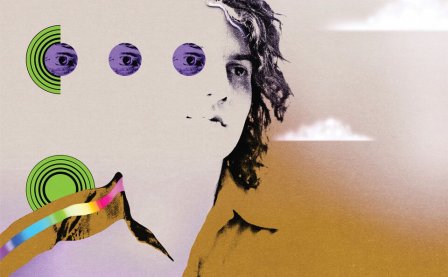“Is there anyone awake/ I am the only one who believes in staying up late?” asks James Friley (a.k.a. Idiot Glee), and there is something about this line that encompasses Idiot Glee’s music. The sentiment, in itself, is not uncommon — I can’t help imagining the myriad teens from Pump Up The Volume, each individual in the darkness connected, an imaginary community, through Christian Slater’s anti-authoritarian angst — though Slater’s anger and teen horniness are little in evidence. And so one is tempted to answer, Of course there are others staying up late, James; but instead of singing songs that sound like doo-wop drenched in purple drank, they’re chugging brews (Friley, as a Mormon, doesn’t drink), hooking up, and/or dancing to Beyoncé. Friley, unfortunately, may not be above making mildly homophobic quips in Vice magazine interviews, but this adolescent sensibility, more akin to Happy Harry Hard-On, doesn’t make itself felt in the music.
However, it’s precisely at this juncture, between the universal and the particular, that Friley’s music reveals its originality. At times in the lyrical content a teen simplicity is apparent (“no one messes with my girl”), but there are also some beautifully original moments. Opener “It,” for example, calls to mind a “Boys Don’t Cry” sung from beyond the grave (“So it goes, only when you cry/ But I don’t, that’s ‘cause I’m a guy”), while album standout “Trouble At The Dancehall” is reminiscent of Nick Cave’s “John Finn’s Wife” as read through the sonic aesthetics of a beat-driven “Christina the Astonishing.” Indeed, speaking of Cave, there is something of the Biblical gothic here, the hushed echoes of the chapel and the intimacy of communion, which one is tempted to ascribe to Friley’s Mormonism, though this may be an unwarranted association of stereotypicality. And that darkness, undertones of the apocalypse read through a lulling lens, is manifest in tracks like “In The Sadist’s Garden,” with its troubling of identity and subjectivity, its lyrical and musical evocation of the garden as the realm of both innocence and corruption; or “Don’t Drink The Water” with its inevitable Jim Jones associations (subtle here as they were not on Cults’ recent debut).
Friley has taken the sound of his debut EP — the four songs of which all appear on Paddywhack — and maintained that arresting, zombie barbershop quartet aesthetic, while also extending it into new developments, intervening piano lines and looped organ riffs, with which it blends in ways that never jar (your preserves). He cites Pet Sounds as a central influence, and this can be heard in the beautiful 60s harmonies and precise, echoing production, but, without wanting to suggest a stereotyped darkwave sound, “Pet Sematary Sounds” might be more appropriate. There is a sense both of harmony in the broadest sense — a textural and gently mouldering oneness — as well as a charmingly naïve solitude that brings to mind the classic figure of the outsider artist. It’s in the integration of these tendencies, the tender cultivation of tendrils connecting internal and external, the sacred and profane, that Friley’s nightbloom shyly emerges and thrives.
More about: Idiot Glee




